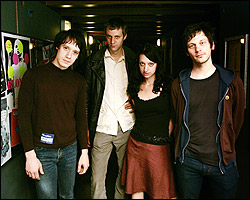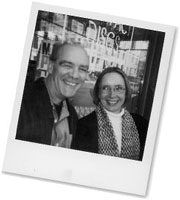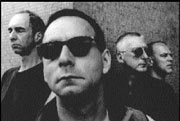WHEN YOUR BUSINESS is food and drink, your business is oftentimes also smoke—or at least smokers, so many local restaurant and bar owners have known for a while that Washington’s recently passed smoking ban was imminent. As Tango and Bandoleone owner Danielle Philippa put it, “I’ve been surprised that Louisiana and New York were [smoke-free] before us.”
Philippa says she’s “fairly happy” about the new law; her employees will no longer be exposed to secondhand smoke, and the antismoking diners who have told her that they wouldn’t eat at her restaurants unless she made them smoke-free are, as of Dec. 8 when the law goes into effect, potential new customers. She speculates that many social smokers—those who smoke only when they drink, and bum but never buy—will end up quitting altogether, which could be good for food sales considering cigarette smoking tends to decrease appetites. Among restaurant owners who hadn’t already banned smoking voluntarily, the story is more or less the same around town, although no one I spoke to is taking the ban lightly.
Out in old Ballard at Hattie’s Hat, the smoking ban is relatively well timed. Co-owner Kyla Fairchild says they’re just finishing up on a remodel in the back dining room, where smoking has been prohibited anyway. The new law makes it easier to reposition the new space as a smoke-free lounge, somewhere to linger over drinks and food.
“Smoking has always hurt our food business and we’ve debated getting rid of the food altogether and just becoming a bar,” says Fairchild. Had they done that, fans of Hattie’s Guinness meatloaf and the restaurant’s weekend brunch might have rioted, but if the restaurant had ever decided to go fully smoke-free on its own, the very sizeable population of beer- and whiskey-drinking bar patrons would have thrown their own riot. Instead, legislators and voters made the decision on the restaurant’s behalf.
Multiple-club owner Linda Derschang has been doing some well-timed remodeling, too. The popular back deck at her oldest property, Linda’s Tavern, is being built out to double its size (there will even be a second bar outside), making it possible to light up well over 25 feet away from the back door. (In case you’ve been sleeping: Our law is the strictest in the nation and stipulates that you must be more than 25 feet away from doors, windows, and vents of public places if you’re smoking.)
But there are some who don’t see a bright side. Tini Bigs owner Keith Robbins says while liquor wins, he does more in cigar sales than he does in beer, wine, or food. Robbins figures he’s spent more than anybody in town on ventilation and smoke-eating devices, and while, for example, El Gaucho has more space in which to make up revenue, he’s sort of stuck. (As another example, Daniel’s Broiler in Bellevue is turning its cigar room into a wine room.) Robbins reports that patrons are smoking like crazy at his bar these days, and on Dec. 7, he’s throwing a secondhand smoke party. Similarly, Linda’s will host “the Last Drag” that night.
Regardless of their attitudes, all the business owners I spoke to are unsure about the details of I-901. What does it mean to “prohibit” smoking on their premises? What does it mean to prohibit smoking within 25 feet of their premises? Who exactly does the prohibiting? And who gets the fine when someone lights up? They say specific information is scarce, and many have heard that waivers are available if you can prove smoke isn’t wafting around nonsmokers.
Roger Valdez, tobacco prevention program manager at Seattle King County Public Health, told me that before business owners worry about obtaining waivers, they should “take a deep breath, relax, and see what happens.” (And yes, he admits that’s easier said by a non–business owner than by someone whose livelihood relies on happy drinkers.) He says the law is not a punitive one like, for instance, the law against jay-walking. He compares I-901 to a building or health code; if there are complaints, the Health Department will follow up. Valdez stresses there is no desire on the part of local law enforcement or the Public Health office to “catch anyone on the wrong side of 25 feet.”
Club owner and outspoken I-901 opponent Dave Meinert wonders, then, why that provision is included in the law. For Meinert and the business owners I spoke to, I-901 represents another loss of personal freedoms—for diners, for drinkers, for business owners, for smokers, and for nonsmokers. When looked at objectively, I-901 represents the revocation of choice, plain and simple. What might be next? A law prohibiting foie gras? Well, actually, maybe so, but that’s for another column.







